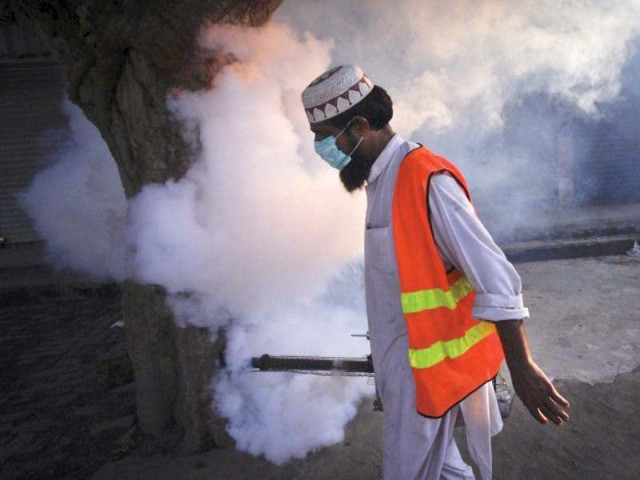Sindh/ Karachi:
Karachi, as well as the rest of Sindh, has been full of the dengue and malaria season, which descends every year after the season after the monsoon, and yet minimal measures have been taken to combat this. In recent years, spraying in Karachi has not been carried out. Only 18 employees are assigned to spray the city.
Medical experts routinely warn that it is essential to carry out the germicidal spray after a rain spell. These experts also claim that during the monsoon, along with mosquitoes, flies and other insect allergens. Inaction exacerbates further the spread of diseases such as diarrhea.
During the monsoon season, female mosquito eggs (Aedes aegypti)That causes the dengue virus in Karachi, begins to hatch in larvae, and these mosquitoes reproduce rapidly. These mosquitoes require that human blood survives, which they obtain by biting humans. Because of this, from September to December, the dengue virus intensifies.
The relevant authorities of the district and health are aware of this situation, but during the last three years, in particular, when the central office of vector -transmitted disease moved from Karachi to Hyderabad, they have led to being practically inactive of germicidal chemical spray routine to eliminate these mosquitoes.
Insufficient measures
For a population of at least 20 million, only 18 employees are assigned to carry out malaria and dengue spray in Karachi. These employees have not been paid their salaries during the last eight months and they have not become permanent in eight years.
More than 100 positions are vacancies in the dengue program executed under the Department of Vector Transmitted Diseases.
The 18 dengue fumigation employees are published in the seven Karachi districts, with two or three spray employees by district in Karachi. However, these staff do not work under the health offices of the District (DHO).
Pulverization employees, under anonymity, said that germicidal chemical spray has not been carried out in Karachi for several years, but that politically influential officers have been made regularly in their homes.
The affected employees said that under this program, fumigation experts have been working on the contract during the last eight years and receive their salaries once a year. These employees have ranks of grade 2 to grade 17.
These employees also declared that in Karachi and in all SNDH, after the rains of the monsoon, mosquito breeding increases rapidly from September on, and from September to December, dengue and malaria become extremely aggressive, which leads to hundreds of valuable lives that are lost every year.
Read: Vector transmitted diseases continue to affect the city
The employees of the Department of Vector transmitted diseases said that for the spray campaign to eliminate mosquitoes in Karachi, each district has RS1.2 million annually, while the budget for germicidal chemicals is separated.
In accordance with the budget documents received by He PAkGazette ExpressIn fiscal year 2024–25, the budget for the dengue control program under the vector -transmitted disease department increased by RS2.5 million to RS67.349 million, of which RS16.66 million were assigned to sprinkle.
In the current budget year, RS14.5 million have been assigned specifically for chemicals used in mosquito killing aerosols. Despite this, the spray campaign in Karachi has not started.
The director of the Vector Disease Dengue Control Program, Dr. Mushtaq Shah, said that “we provide technical support to the health officers of the district and local governments for the elimination of mosquitoes and the destruction of larvae that arise from the eggs of the female mosquitoes.”
“The spray campaign is under the control of district health officers, and measures are being taken to launch the campaign, and in many areas the spray has already begun.”
Dr. Shah declared that in collaboration with DHOS, the spray campaign has been launched to eliminate dengue.
Meanwhile, the health officers of the district in Karachi claim that for fumigation they do not have enough personnel from the disease transmitted by vectors, and the worried personnel are not administratively under the DHO.
Overwhelmed hospitals
Public hospitals remain little prepared to treat the influx of dengue and malaria patients who descend every year. People affected by the dengue virus suffer from high fever along with a severe drop in platelet count. However, there is no government agreement for the provision of platelets for people affected by dengue, so most patients are forced to resort to private hospitals to receive treatment.
Dengue case trends 2020-2025 in Sindh
At present, in private blood banks, a mega platelet unit to save the life of a dengue patient is sold for RS30,000 to RS40,000, while a single platelet unit is sold for RS3,000 to RS5,000. A mega unit is administered to patients who experience a severe fall in platelet count.
Meanwhile, officials of the provincial department of Health affirm that government hospitals are gradually activating rooms and other facilities to prevent dengue.
Affected people from 2020 to 2025:
According to data published by the Department of Vector Transmitted Diseases, in 2020, a total of 4,318 individuals were affected by the dengue virus in Karachi and Sindh, and three people lost the lives of this virus. In 2021, 6,739 individuals were infected, and the virus claimed the lives of 28 people.
Despite this, no mosquito spray campaign was launched through Karachi or Sindh, due to which the virus intensified in 2022. In that year, 22,274 people were affected and 64 people lost their lives. In 2023, 2,800 individuals were infected by Dengue, but no deaths were reported.
In 2024, 892 cases of dengue have been reported and a patient died. The deceased was a resident of the Central District of Karachi.
Until now in 2025, 557 cases have been reported and a patient has died. In all Sindh a total of 162,091, and three confirmed cases of brain malaria have been confirmed.




